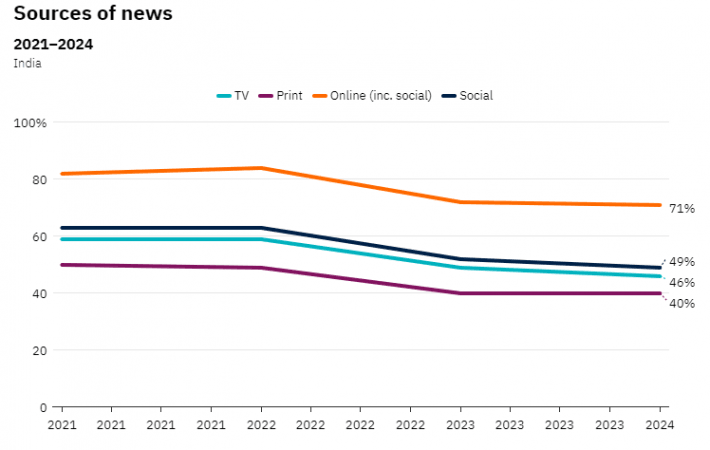
A majority of India's new generation gets their news via social media platforms, with half of this group using YouTube (54%), followed by WhatsApp (48%). This is based on the recent Digital News Report 2024 released by the Reuters International School of Journalism.
The report studies "consumption of online news globally. It is based on a YouGov survey of more than 95,000 people in 47 countries, representing half of the world's population."
The report tracks various trends, like "the growing importance of platforms in news consumption and production, audience attitudes towards the use of AI in news, the role of creators and news influencers and how much people pay for news."

Here are some of the trends from India based on the Report:
- There has been a decline in news interest across all platforms from the period of 2021 onwards.
- Print (40%) and TV (46%) remain popular platforms for respondents to access news, especially during this crucial election year.
- NDTV, Times of India, Republic TV, and BBC News continue to enjoy high viewership in their offline and online products, among the younger, urban, mostly English-speaking sample.
- Smartphones (79%) are the main device used by users to access news, followed by computers and tablets.
- Overall trust in news increased slightly in this election year (41%).
- India's performance in terms of freedom of the press appears bleak. The country holds a rank of 159 out of 180 under the RSF World Press Freedom Index.
- YouTube and WhatsApp continue to dominate the overall social, messaging, and video networks.
The report also makes a note that the "run-up to the elections saw a number of new laws passed, some replacing archaic legislation, which many fear may undermine press freedom in India."
For instance, it highlights that the Digital Personal Data Protection Act (DPDP) "lacks exemptions for journalists to access personal data for doing journalistic work that might be in the public interest."
Next, the Press and Registration of Periodicals Act has raised concerns regarding the "unspecified powers given to the government to issue guidelines or make rules under the Act."
The third new law, the Telecommunications Act 2023, has been flagged regarding "excessive powers for surveillance, internet shutdowns, and government access to encrypted social media messages."

















